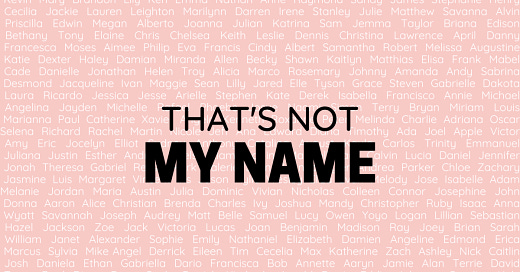The Power of Saying Someone’s Name Right
Why attention to detail in something as simple as a name can shape belonging, trust, and connection at work
The waiter is asking for our names.
“Justine,” my friend says.
The waiter paused.
“Justin, you mean?”
She smiled and corrected him.
“No. Justine.”
He laughed.
“That’s a boy’s name. Are you a ladyboy?”
It happened quickly. A passing comment. The kind that floats over the table and disappears before anyone reacts (except for me, as I thought this was really not an OK comment). It stayed in my head, and I discussed it with Justine.
She said it wasn’t outrageous.
She thought it was ordinary.
These moments happen more often than we admit. A name misheard. A correction brushed aside. A shrug disguised as a joke.
A name is usually the first thing someone offers. Before their story. Before their work. Before anything else, there is that small introduction: this is who I am. And yet, it is one of the first things to be reshaped, shortened, guessed at, ignored.
Justine becomes Justin.
Nahhas (El Nahhas is my last name) becomes a first name, a last name, or something entirely unfamiliar.
Not because people can’t read.
But because they don’t really look.
What does it say when someone has their name clearly written on their profile, in their signature, in every message, and it’s still not used correctly?
It says: I didn’t think it mattered enough to get it right.
And maybe that’s what makes it feel heavier than it should. Not the name itself, but what it signals underneath. A kind of quiet dismissal. The feeling that your identity is something others can abbreviate when it becomes inconvenient.
Still, people try. They leave clues. Capitalize their name in the footer. Add a phonetic spelling in parentheses. Repeat it kindly, hoping this time it will stick.
Sometimes it does.
Often it doesn’t.
And so they laugh it off. Because what else do you do when it keeps happening?
But that doesn’t mean it doesn’t leave a mark.
Getting someone’s name right is one of the simplest things we can do to show care. It takes a few seconds. But those few seconds say: I see you. I’m not skimming over you. I’m not too busy to pay attention.
It’s not about being perfect. It’s about being present.
In the quiet culture of (remote) work, where everything blends into pixels and time zones, it’s easy to forget that each name on your screen belongs to someone real. Someone who, at some point, had to repeat it more times than they should have. Someone who’s learned to notice when people stop trying.
There’s no form to fill out for this. No DEI strategy required. Just a choice.
Read the name again.
Ask if you’re unsure.
Use it the way it was given.
Because that small act? It’s not small at all.
It’s one of the first ways we say: you belong here.




This is a very thoughtful essay thank you. I’m currently working on being better at remembering names when I first meet people.
Names are our first archetypes, the sound clusters we respond to before we understand them. I once imagined a world without names. How would we ever find ourselves in it? Language needs names to shape stories and give the world form.
But I still wonder:
What image of us flickers in someone’s mind when they say our name when we are absent? Which version do they see? Which memory? Which projection?